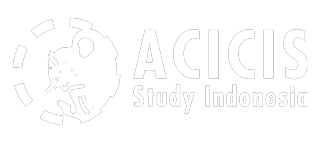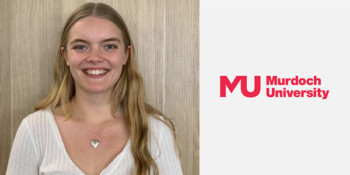Arienne Coate was a participant in the 2021 Virtual Law Professional Practicum. Arienne is studying a Bachelors of Law, Bachelor of Arts at Murdoch University. Arienne received a $3000 New Colombo Plan mobility grant to support her participation on this program.
Q: Why did you decide to undertake the ACICIS program?
I decided to undertake the Law Professional Practicum because I have a passion for learning about new cultures and countries and in the face of the pandemic, this program was an opportunity to combine this passion with my tertiary studies. The program, despite being conducted virtually, offered me a completely immersive Indonesian experience with language, culture and law specific lessons. Overall, I saw the program as a huge opportunity to expand my horizons and gain insight to the inner workings of Indonesia, one of Australia’s closest neighbours whilst also acting as a stepping-stone in my career into international law.
Q: Did you receive a New Colombo Plan Mobility Grant? Do you think the NCP is an important initiative? If yes, why?
Yes, I received the NCP Mobility Grant and feel that it is an extremely important initiative. It is vital that students are provided with these opportunities to form connections outside of Australia and diversify their learning experiences and programs such the mobility grant make this an option even in the face of Covid. Before the program I was unaware of the close relationship between Indonesia and Australia, and this grant allowed me to not only learn about the culture but also to form my own professional relationships within the Indonesian community. Relationships that have aided me in my domestic studies and development of my career aspirations.
Q: How have you found the academic components of this virtual program – i.e. the language classes/seminars?
The academic components of this program have been crucial to my overall practicum experience. Providing me with a foundational understanding of Indonesian culture, language, society and legal frameworks, I was able to make the most of my internship, drawing on this important background knowledge. Moreover, the classes allowed me to development a support network within the program, of fellow interns and ACICIS staff guiding me through this experience. Throughout the seminars and tutorials I was exposed not only to esteemed academics and intricate knowledge systems but also provoking discussions that I have carried with me into my own research projects and world perspective.
Q: What organisation did you intern with?
I interned with KontraS, a NGO covering a range of matters such as human rights violations, COVID-19 impacts, and international military relations. Throughout the internship I conducted mini research assignments on current human rights concerns, submitting reports to the International Advocacy division. I also attended webinars between South-East Asian civil society representatives and embassy advocates from surrounding countries discussing the latest events in the international law sphere with updates on various human rights issues like the matter of enforced disappearances and freedom of the press. Over the course of the practicum, I worked on my own research project inquiring into freedom of expression within Indonesia, specifically through the examination of legislation, constitutional court decisions, law implementation and case studies which I then presented to a group of KontraS department heads along with a final report. Additionally, I worked with my supervisors and fellow interns to update data regarding Indonesia’s next Universal Periodic Review by the United Nations, investigating previous UPR recommendations against the current human rights situations.
Q: How have you found the work culture (albeit online) of your host organisation? How is it different to work experience in Australia?
I found the work culture significantly different from that of Australia. I felt that relationships between colleagues was valued predominantly as friendship as compared to the professional boundaries found in Australian workplaces. This approach created a more comfortable learning environment and really helped me navigate the foreign legal and political system. I felt that I could easily approach my supervisors with any concerns or questions without being a burden and they were eager to help in any way possible. I found this quite beneficial as opposed to the rigidity of the Australian workplace, where it is more difficult to express challenges being faced and ask questions.
Q: What are the main skills you have learnt during your virtual internship?
I have learnt how to communicate more directly, research efficiently, adapt to new cultures and develop my writing skills. I have become more confident in my communications with my superiors understanding how important it is to communicate directly and seek confirmation of instructions when uncertain as well as asking for help and advice when needed. I also got into the routine practice of researching and putting together reports in short time frames and have seen the improvements this has led to in my domestic studies.
Q: What did you find to be the most rewarding part of this virtual experience?
For me the most rewarding part of this experience was in learning about the Indonesian culture and working on projects that extended beyond Australia to the international community and that of South-East Asia. I felt that all the work I put into the program has really developed my own skills and provided a real foundation for my future legal career. Before undergoing the practicum I felt unsure about the direction of my career however, the fulfilment and passion I have felt throughout this experience has given me direction for my future and goals to work towards.
Q: Were you able to learn about the Indonesian culture from this virtual program? If yes, how was this achieved?
Yes, I learnt a lot about the culture from the language course and the way our teacher conducted the lessons always eager to hear about our personal life and for us to develop friendships. There were a few documentaries available to watch which were then followed by question and answer sessions with the directors and film crew who provided valuable insight to the Indonesian culture and society. During my internship, I spent a lot of time talking with my supervisors comparing Australian and Indonesian life, highlighting the similarities and differences we experience.
Q: How will the virtual internship benefit or influence your future career?
It has inspired me to pursue a career in international law and South-east Asian relations, with life-long connections in KontraS and a newfound motivation to learn more about Indonesia and continue to follow their human rights situations.
Q: Would you recommend this virtual program to your friends?
Yes 100%
Q: Favourite Indonesian word/phrase:
Bagus, bagus.
Q: Describe your experience of the virtual internship program in three words:
Friendship, learning, opportunities


